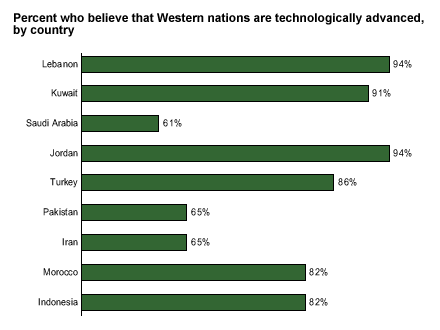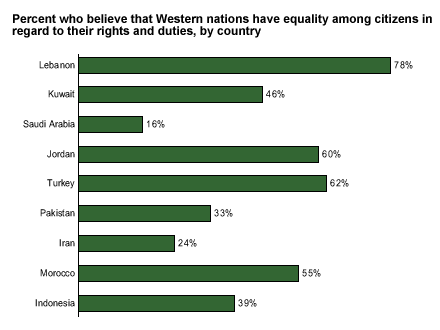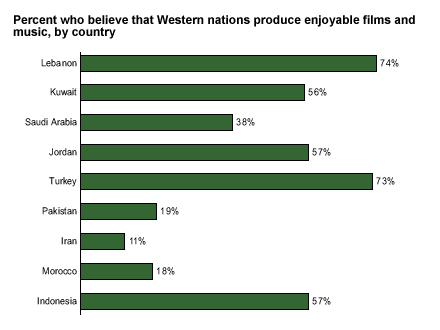Gallup's recent poll of nine predominantly Islamic countries shows that residents of these countries tend to have very negative views of the United States and the Western world in general. However, residents of these countries are not universally negative in their evaluations. Specifically, most admire the West's scientific advancements, and many also respect the equality that people living in Western cultures enjoy. A significant proportion also believes that the West produces enjoyable films and music.
The poll asked respondents to rate the Western world on a set of 10 attributes. On most of these, the majority of opinions are decidedly negative, including the West's level of respect for Arab/Islamic values, its stance on the situation in Palestine, and the degree to which Western countries care about poorer nations.
The West's technological advancement is the only positive attribute on which a consensus exists in the Islamic countries surveyed. At least six in 10 respondents in each country said that the West is "technologically advanced," including more than nine in 10 respondents in Kuwait, Lebanon and Jordan. The positive view is tempered, however, by the belief that Western nations are unwilling to share their technological expertise with less developed nations. In only two of the nine countries (Indonesia at 43% and Pakistan at 31%) do more than a quarter of respondents say that Western nations are willing to share their knowledge.

Many Believe Western Societies Promote Equal Rights for Citizens
Majorities in four of nine countries believe that Western societies are egalitarian, at least in terms of the rights and duties their citizens have. This view is most widely held in Lebanon, where 78% say this applies to Western societies. Roughly six in 10 residents of Jordan, Turkey and Morocco believe this to be the case, as do 46% of Kuwaitis. However, just 16% of Saudis and 24% of Iranians view Western societies as egalitarian.

Many residents of predominantly Islamic countries also have positive things to say about Western entertainment. In five of the nine countries, a majority says that Western societies produce enjoyable films and music. Once again, residents of Lebanon are most likely to hold this view (74%) followed by Turkey (73%). On the other hand, those in Iran (11%), Morocco (18%) and Pakistan (19%) are most likely to disagree.

Some Groups More Likely to Give West Credit
Certain subgroups in the Islamic world are less likely than others to say positive things about Western culture. For example, those without any formal education are less willing to say that Western nations are technologically advanced, that they treat minorities in their societies fairly, or that they provide equality for their citizens. This trend is evident in the three countries with significant numbers of citizens without formal education -- Pakistan, Iran and Morocco.
The educational differences are quite large. In Pakistan and Iran, only about four in 10 without formal education say that Western nations are technologically advanced, but among those with formal schooling, more than seven in 10 say this. In Morocco, 64% of those without formal education believe the West is technologically advanced, but 88% with formal schooling do. Additionally, in four countries (Iran, Morocco, Pakistan and Turkey), the likelihood that one will say positive things about the West increases with each succeeding level of education.
While generally there are not large differences according to age and gender, younger respondents in seven of the nine countries are significantly more likely than older respondents to say the West produces enjoyable films and music. Significant age differences are apparent on this question in Lebanon, Kuwait, Saudi Arabia, Jordan, Turkey, Pakistan and Morocco.
